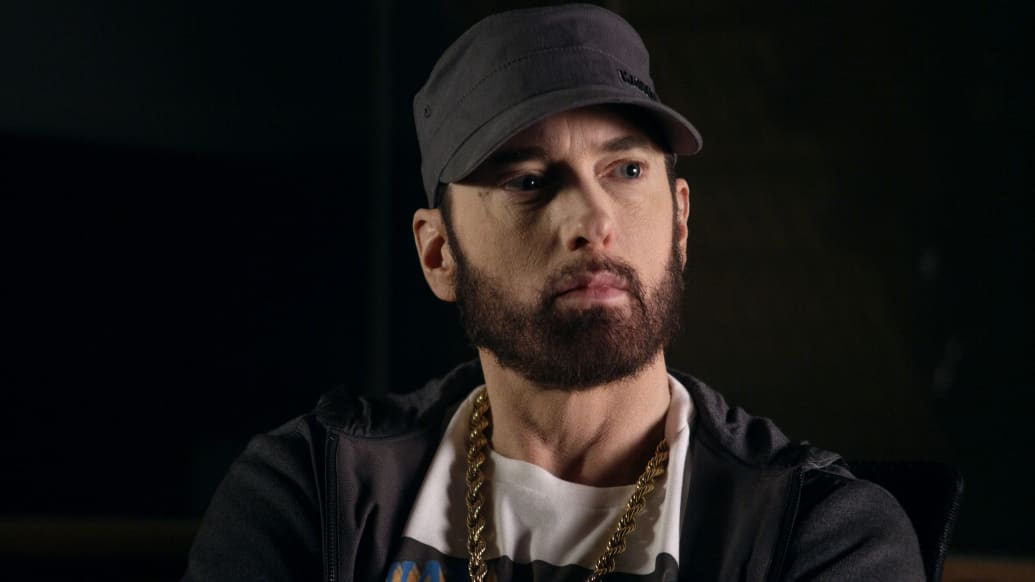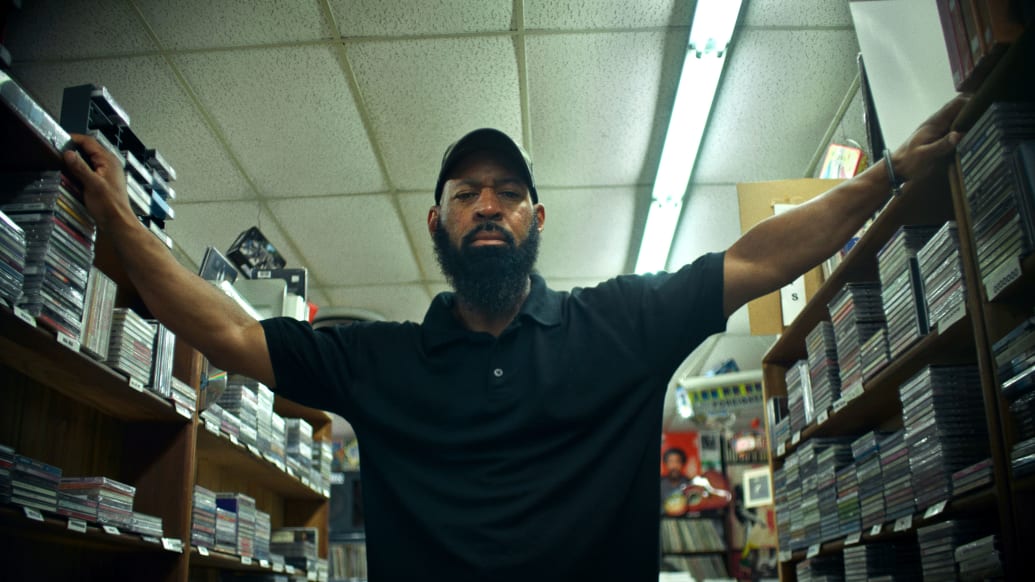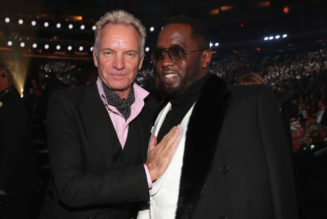Every music lover remembers how drastically the world shifted at the turn of the millennium with the introduction of the MP3; all of a sudden, file-sharing made it possible to find any song you wanted at any time. But where did the music come from and why would Apple release the 10,000-song capacity iPod in 2001, knowing full well that no one would pay $1 per song to (legally) fill it?
A new documentary, How Music Got Free, attempts to answer those questions while introducing its audience to a slew of pertinent characters—from A-list artists to music pirates themselves—along the way.
Released Tuesday on Paramount+ and executive-produced by LeBron James and Eminem, the two-part documentary details how file-sharing technology led to some of the biggest, most disruptive online leaks of new music, much to the industry’s horror. The doc is based on the book of the same name by Stephen Witt, who together with director Alex Stapleton (Shut Up & Dribble; Hello, Privilege. It’s Me, Chelsea) set out to explore how “an entire generation got used to the idea that music should be free.”
Stapleton tells The Daily Beast that there’s a lot more to that story than people know, and that it should make us question “who got in trouble [for piracy] and who we look at as the criminals or thieves, and who we look at as the innovators.”
Following the music industry’s embrace of CD technology in the ’80s, the MP3 was invented in 1995, laying the path for pirated music hub Napster to emerge four years later. The music industry initially tried to shutter the site, but only gave it more attention—and more illegal downloads—by suing for copyright infringement.

Paramount+
By 2002, un-purchased music was already widely available online, but pirates upped the ante by releasing Eminem’s then-hotly anticipated new album The Eminem Show nearly a month before it was even finished. Record executives scratched their heads as to how the leak happened, and as more and more new music leaked to the public, costing the industry millions of dollars, the mystery only deepened.
No one would have guessed at the time that the culprits were a rag-tag group of Universal Music CD pressing plant employees in Shelby, North Carolina, who were supplying online pirates with unreleased music. “They were severely underpaid for the work that they were doing,” Stapleton tells The Daily Beast.
Former employees explain in the doc how they’d sneak CDs out of the plant through their belt loops or taped to plates of food. But that was only half the battle—the rest of it was masterminded by Dell Glover, a plant manager who was also a self-taught computer genius. “We know Steve Jobs, we know Jimmy Iovine, we know what happened to a lot of other people that were a part of this. But no one knew the pirates and no one knew who Dell was,” Stapleton explains.
A Black high school graduate who’d had no formal computer training, Glover had worked his way up in the CD plant—one of the only places available to work at the time in Shelby—becoming one of its highest performing managers. Glover’s computer prowess eventually led him into the world of music piracy, where he saw an opportunity to deliver a touch of joy and economic uplift to his tiny, impoverished town—where many people couldn’t afford to pay full price for music or movies—and make additional money for his family.

Dell Glover
Paramount+
By contributing pirated music to the dark web, Glover was granted access to servers that held terabytes of data filled with entertainment that he’d supply to local businesses, buoying their profits by giving them bootlegged content to sell. Years into the operation, Dell was eventually caught by the FBI, convicted, and served three months in prison. Meanwhile, Apple had reinvented itself with the iPod, which allowed them to cash in on the pirated music craze.
“Steve Jobs made a lot of money off of the iPod,” Stapleton tells The Daily Beast. “It really resurrected the brand and [iPods were] full of pirated music. So how do we regard him versus someone like Dell?”
That’s the question at the root of How Music Got Free. Stapleton explains that what drew her to this project was the opportunity to “tell a story about a Black Southerner whose story was completely under a rock and for people to finally get the truth, and maybe that will make us look at things differently.”
The documentary aims “to give as much context to that conversation so that you don’t get stuck in ‘this person is stealing something,’” the director adds. “[So that people] understand that this is a very impoverished area, it’s deprived of things that some other cities have, and when you pay people nothing, that to me is the bigger issue than getting caught up on what they took.”
The web of events at the center of the music revolution is a complex one. Where Glover was able to fill an economic gap for his town, the “free music” he released led to job losses across the board at Universal. It also harmed the artists themselves. Eminem and 50 Cent, who both appear in the doc to discuss the impact that piracy had on their hip-hop careers at the time, expressed the rage they felt that their music was being leaked before it was finished. But as artists advocated for a legislative solution, politicians turned up their noses at the “filth” music they produced. The music industry was on its own.
In an effort to plug the hole they couldn’t find before discovering Glover’s part in the mess, the Recording Industry Association of America began suing teens for sharing music files online, attacking their own biggest fans and destroying lives in the process. Stapleton says suing kids was “clearly wrong,” but the events that led to the lawsuits go far deeper than the industry’s response.

Paramount+
How Music Got Free sheds a light on “race and access” in America, the director explains. “If Dell [Glover] was a white guy who was born in Los Angeles or San Francisco or New York, the story would’ve been completely different. I really trust that people will watch this and understand how race did play a factor in it on many different levels.”
She also says the story may teach us a thing or two about how to deal with AI, a growing disruptor to music creation and distribution today. “[This] story is about CDs and MP3s and took place a while ago, but the drama and the friction of technology and art is very much at play right now,” she says.
“I hope that the takeaway is for us to potentially get out of our echo chambers of just the big businesses, the corporations, providing the answers for what society will look like when it comes to [AI] and these businesses. Perhaps we should be looking outside of that and in some of the most unlikely places.”









